

![]()
E T Loseby and the Godiva clock
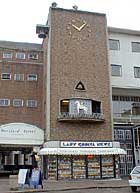 |
the Godiva clock in August 1998 |
Edward Thomas Loseby, born in Leicester in 1817, was apprenticed to Rotherham's in Coventry from 1831 to 1838 when he moved back to Leicester and received the freedom of the city (thus allowing him to vote). In 1870, he designed Coventry's Market Hall clock. In the contract for the clock, he had agreed to forfeit £1 for every second it varied each day, but although the clock eventually cost twice the original estimate of £308, Loseby never had to pay a forfeit. Trials in 1888 showed it to be accurate to within 0.2 second, making it far superior to the rival Westminster clock. Its time was set by a Greenwich time signal supplied by Rotherham's, who provided this service in the 1870s and 1880s.
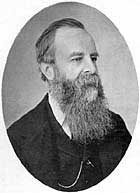 |
Edward Thomas Loseby |
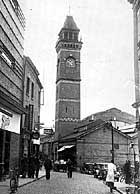 |
The Market Hall Tower in 1937 |
In 1942, the market hall, by then unstable, was dismantled, but Loseby's clock movement was stored and then used in the Godiva clock, erected in Broadgate in 1953. The clock's set of hands are very much of that period, and there are doors in the wall out of which pop -- on the striking of the hour -- 'puppets' representing Lady Godiva on her ride and, above, Peeping Tom the tailor who, watching Lady Godiva despite instructions not to, is struck blind. There have been protests that these figures are more suitable to a fairground and not in keeping with the dignity of Coventry.
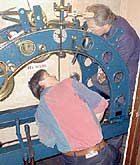 |
Alan Midleton and Jerry Elford of the Rotherham's team examine the original movement from The Market Hall Tower clock |
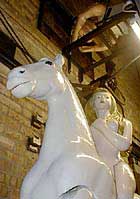 |
inside the Godiva clock -- Peeping Tom can be seen top right |
Back to history